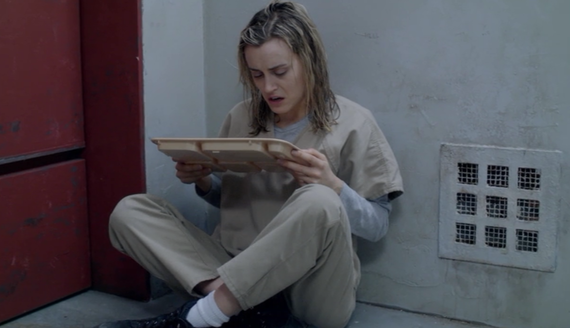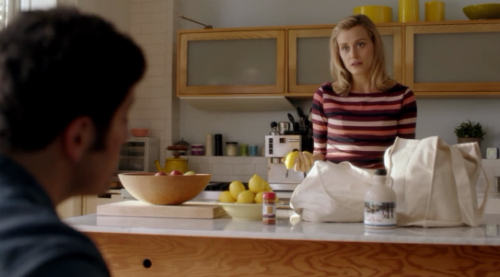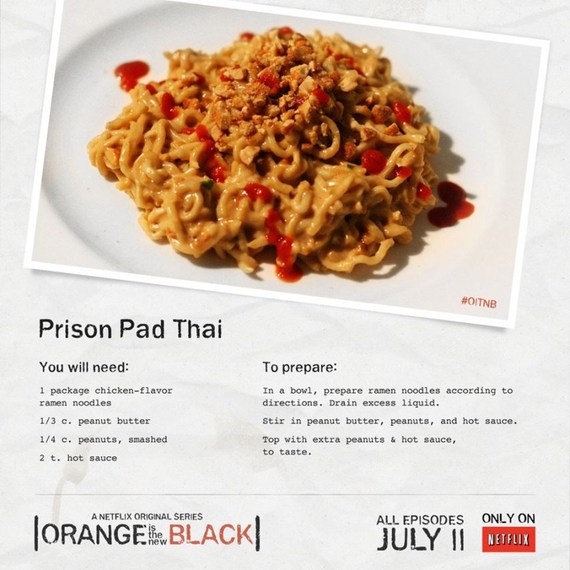As excitement builds over the rapidly approaching second season of Netflix's hit show, Orange is the New Black, I am crossing my fingers that one of the show's smartest plotlines will not be abandoned: its scathing critique of foodie culture.
Foodism, after all, is a recent phenomenon that we have yet to fully understand. The term "foodie," defined by the Official Foodie Handbook as a person "who is very very very interested in food" and "considers food to be an art," was only coined in 1984.
Today, thirty years later, foodies are taking over the silver screen. Detective Charles Boyle (played by Joe Lo Truglio) of Brooklyn Nine-Nine is hopelessly out-of-touch when it comes to social cues, but he sure knows the difference between pizza and butternut squash truffle butter flatbread. Parks and Recreation's Tom Haverford (played by Aziz Ansari) displays the superficial underside of foodie culture; he envisions starting an escargot delivery service -- "Snail-Mail" -- but he's a pure opportunist more excited to Instagram his food than to eat it. And then, of course, we always can choose among dozens of reality shows that feature foodies as the stars, the audience, and the entire plot.
Orange is the New Black, however, is the only show out there to examine foodism in all its complex, hypocritical, umami-bursting glory. The fact that we've all got to eat, regardless of our legal status, makes food a particularly powerful way to illustrate the logic behind our everyday choices and preferences. The stark contrast between Litchfield Prison's walls and the abundance of the farmers' market gives us a perceptive glimpse into the origins of modern foodie mania, the foodie's core values, and why foodies are so insufferable to be around.
1) Where Foodies Come From:
Foodism often doubles as a code word for affluent white privilege, and OITNB doesn't get this wrong. We're expected to understand the social position of protagonist Piper Chapman (played by Taylor Schilling) -- hence her unfitness for prison -- by her well-stocked pantry. Yet wealth alone does not a foodie make. In fact, foodism really thrives as a surrogate mark of status for the harder pressed younger generation, the unlucky millennials destined to be less successful than their parents. After all, we're constantly reminded that Piper and her fiancé Larry (played by Jason Biggs) live way beyond their means (she sells artisanal soap, he's a struggling journalist). They might have an expensive grocery bill, but they're renters, not owners, living in dread of asking their parents for money yet again.
2) What Foodies Care About:
The foodies of OITNB are intensely concerned with the so-called failures of the modern food system. Everything in Piper's kitchen, according to her fiancé Larry, is "locally grown, grass-fed, conflict-free." This is a world where the mere sight of a pre-cooked store-bought chicken in the fridge can ignite a violent lover's quarrel, where, in the eyes of the black prisoners, whiteness is encapsulated by the renunciation of sushi in favor of vegan cuisine.
This self-conscious awareness also extends to the plight of the food-insecure. But while Larry might worry about the ethical implications of undergoing the Master Cleanse while people are starving in Kinshasa, he doesn't understand what food insecurity actually looks like, even if it slaps him in the face. When he sees Piper after she is starved for three days, Larry isn't sure what to say. "Your face is so... cheekboney," he cheerfully observes.
"We're going to deny ourselves sustenance while there are people that starve in Kinshasa?"
3) Why We Should Care:
What then is so off-putting about these foodies?
Is it their penchant for fetishizing food? It's easy to laugh at Larry's pathetic attempt to initiate phone sex by rattling off his grocery list from Whole Foods: purple kale, crispy snap-peas, heirloom tomatoes, the roasted and sugared so-called "crack almonds" forayed in the bulk foods aisle. (Leave it to the foodie to invent a pet name for such things.)
Or maybe the problem is the sheer disconnect between food's basic function -- filling you up -- and the countless moral and aesthetic bases upon which foodies evaluate it. Organic blueberries don't get you very far in an institution running on donuts and Twix bars: cheap, caloric, sugary, and non-perishable. And for all their indictments of mass-produced factory meat, foodies have a remarkably hard time understanding what hunger actually feels like.
I think the stakes go even deeper than that. In OITNB, foodism can best be described as a safety valve. Voting with your fork is all well and good, but by and large, a passion for sustainable agriculture and mindful eating are depicted as substitutes for more troubling issues, often much closer to home, that also might be wrong with our system of food justice. Prison blurs the lines between the pleasant, the palatable, and the utterly disgusting, often leaving it up to us to decide what counts as food and who deserves access to it. I hope that the second season will continue this conversation.
At the same time, we can't expect Netflix to come down too hard on the foodie generation; after all, this demographic makes up a good chunk of OITNB's viewership. Why else would the first season debut alongside a series of prison-inspired recipes, allowing viewers to taste the cuisine of incarceration for themselves? Indeed, much like the plots of the world's first novels, which catered to a new, rising middle class eager to read about itself, OITNB caters to an emergent youthful, despondent, kale-chip-eating generation eager to watch its own trials and tribulations on TV.


